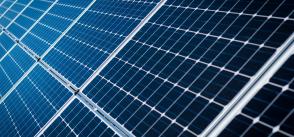
Organic solar cells as an alternative to standard silicon cells
Organic solar cells are considered a competitive alternative to the standard silicon cells that are used in photovoltaics. They are incredibly thin, flexible and translucent, and can be integrated into window glass or used by architects as design elements in large lighting installations.
In contrast to the silicon cells that are often installed in photovoltaic systems on the roofs of buildings, organic solar cells are made of special semiconductor-based polymers called fullerenes - minute carbon molecules that look like footballs. Using fullerenes makes the cells highly efficient but also less durable, meaning that they are unable to match the standard technology over longer periods than 30 years, for example.
[Full text here | photo by Jack Haskell]
Organic solar cells are considered a competitive alternative to the standard silicon cells that are used in photovoltaics. They are incredibly thin, flexible and translucent, and can be integrated into window glass or used by architects as design elements in large lighting installations.
In contrast to the silicon cells that are often installed in photovoltaic systems on the roofs of buildings, organic solar cells are made of special semiconductor-based polymers called fullerenes - minute carbon molecules that look like footballs. Using fullerenes makes the cells highly efficient but also less durable, meaning that they are unable to match the standard technology over longer periods than 30 years, for example.
Read more at: http://phys.org/news/2016-07-material-efficient-sustainable-solar-cells.html#jCp







